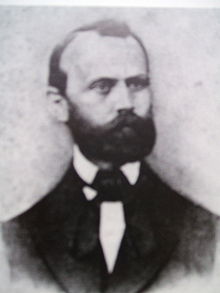Otto Fock
Otto Fock (born April 29, 1819 in Schwarbe auf Wittow ; † October 24, 1872 in Stralsund ; full name Friedrich Otto Heinrich Fock ) was a German Protestant theologian and regional historian .
Life
Fock was born the son of a domain tenant. He first received private lessons and attended from 1834 to autumn 1837 in St. Catherine's Monastery Stralsund housed Sundische school . He studied Protestant theology at the University of Bonn and Berlin . In Bonn he became a member of the Corps Rhenania Bonn in 1837 . In 1843 he completed his habilitation at the Christian-Albrechts-Universität zu Kiel , where he held lectures on various areas of historical theology until 1848.
In addition to smaller work for magazines, Fock wrote the larger work Der Socinianism . According to its position in the overall development of the Christian spirit, according to its historical course and according to its doctrinal concept .
Fock took part in the Schleswig-Holstein survey that began in 1848 as editor of the democratic New Free Press and was elected member of the Schleswig-Holstein state assembly in 1850 . As a result of the restoration of Danish rule in Holstein, he left Kiel and lived first with his brother in his hometown Schwarbe , later in Prohn and finally Stralsund , occupied with literary studies, but prevented from strenuous work due to sickness. In his book Schleswig-Holsteinsche Memories , he took a position on Schleswig-Holstein's uprising from the perspective of a democratically minded Pomeranian patriot.
In the last two decades of his life, Fock devoted himself to the history of Pomerania : He wrote the Rügensch-Pomeranian stories from seven centuries in six volumes. The final seventh volume, which was to cover the period from 1678 onwards, could no longer be produced. Fock has presented the history of Pomerania “in a well-founded manner that is still legible today” (Petrick, 2015).
At the beginning of his Rügensch-Pomeranian Stories, Fock was made an honorary doctorate from the Philosophical Faculty of the University of Greifswald , and at the end of the 6th volume he was made an honorary member of the Society for Pomeranian History and Archeology .
In 1870 Fock received a call to the University of Buenos Aires , mediated by the Stralsund natural scientist Hermann Burmeister , who had been working in Buenos Aires since 1862. But Fock could not answer the call due to illness. Fock died in Stralsund in 1872.
Fonts
- The sacred rock in connection with several apparitions of recent and recent times. Kiel 1845. ( digitized version )
- Socianism according to its position in the overall development of the Christian spirit, according to its historical course and according to its doctrinal concept. Carl Schröder Comp., Kiel 1847. ( digitized version ).
- Schleswig-Holstein memories, especially from the years 1848–51. Veit & Comp., Leipzig 1863. ( digitized version )
-
Rügensch-Pomeranian stories from seven centuries . 6 volumes. Leipzig 1861–1872. ( Digitized UB Greifswald )
- Volume I: Rügen 1168 - With a map of old Rügen and a floor plan of Arkona. Veit & Comp., Leipzig 1861. ( digitized )
- Volume II: Stralsund and Greifswald in the century of foundation. Veit & Comp., Leipzig 1862. ( digitized version )
- Volume III: The time of the German-Danish fighting in the fourteenth century up to the Peace of Stralsund in 1370. Veit & Comp., Leipzig 1865. ( digitized version )
- Volume IV: Internal strife and bloody feuds. Veit & Comp., Leipzig 1866. ( digitized version )
- Volume V: Reformation and Revolution. Veit & Comp., Leipzig 1868. ( digitized version )
- Volume VI: From the last days of Pomeranian independence. Veit & Comp., Leipzig 1872. ( digitized )
literature
- Adolf Häckermann : Fock, Otto Heinrich Friedrich . In: Allgemeine Deutsche Biographie (ADB). Volume 7, Duncker & Humblot, Leipzig 1877, pp. 142-145.
- Fritz Petrick: Fock, Otto (1819–1872) . In: Dirk Alvermann , Nils Jörn (Hrsg.): Biographisches Lexikon für Pommern . Volume 2 (= publications of the Historical Commission for Pomerania. Series V, Volume 48.2). Böhlau Verlag, Cologne Weimar Vienna 2015, ISBN 978-3-412-22541-4 , pp. 101-104.
- Theodor Pyl : O. Fock's life and writings. Along with addenda to Fock's Rügisch-Pommerscher story . (= Pomeranian historical monuments . Volume 4). Greifswald 1874.
Web links
- Literature by and about Otto Fock in the catalog of the German National Library
- Literature about Otto Fock in the state bibliography MV
Footnotes
- ↑ Kösener Corpslisten 1960, 12/246.
| personal data | |
|---|---|
| SURNAME | Fock, Otto |
| ALTERNATIVE NAMES | Fock, Friedrich Otto Heinrich |
| BRIEF DESCRIPTION | German theologian and regional historian |
| DATE OF BIRTH | April 29, 1819 |
| PLACE OF BIRTH | Schwarzenbe on Wittow |
| DATE OF DEATH | October 24, 1872 |
| Place of death | Stralsund |
